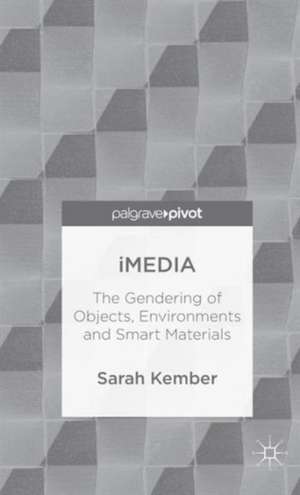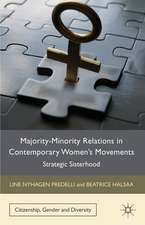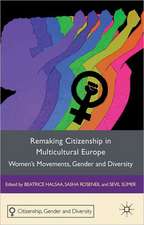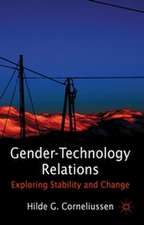iMedia: The Gendering of Objects, Environments and Smart Materials
Autor Sarah Kemberen Limba Engleză Hardback – 6 dec 2015
Drawing on science and technology studies and feminist theory, this book examines the gendering of current and future media technologies such as smart phones, Google glass, robot nurses, tablets and face recognition. Kember argues that there is a tendency to affirm and celebrate the existence of smart and often sexist objects, environments and materials in themselves; to elide writing and other forms of mediation; and to engage in disembodied knowledge practices. Disembodied knowledge practices tend towards a scientism that currently includes physics envy and are also masculinist. Where there is some degree of convergence between masculinist and feminist thinking about objects, environments and materials, there is also divergence, conflict and the possibleopening towards a politics of imedia.
Presenting a lively manifesto for refiguring imedia, this book forms an often neglected gender critique of developments in smart technologies and will be essential reading for scholars in Communication Studies, Cultural and Media, Science and Technology and Feminism.
Preț: 416.92 lei
Nou
Puncte Express: 625
Preț estimativ în valută:
79.78€ • 83.46$ • 66.27£
79.78€ • 83.46$ • 66.27£
Carte tipărită la comandă
Livrare economică 02-16 aprilie
Preluare comenzi: 021 569.72.76
Specificații
ISBN-13: 9781137374844
ISBN-10: 1137374845
Pagini: 130
Ilustrații: VI, 122 p.
Dimensiuni: 140 x 216 x 17 mm
Greutate: 0.31 kg
Ediția:1st ed. 2015
Editura: Palgrave Macmillan UK
Colecția Palgrave Pivot
Locul publicării:London, United Kingdom
ISBN-10: 1137374845
Pagini: 130
Ilustrații: VI, 122 p.
Dimensiuni: 140 x 216 x 17 mm
Greutate: 0.31 kg
Ediția:1st ed. 2015
Editura: Palgrave Macmillan UK
Colecția Palgrave Pivot
Locul publicării:London, United Kingdom
Cuprins
Preface. A Tale of Smoke and Mirrors or Where is the i in imedia?
introduction. Objects, Environments and Materials
iMedia Manifesto Part One
Remember Cinderella. Glass as a fantasy figure of feminine and feminized labour
Ubiquitous Women: everywhere, everyware and everywear
interlude 1. Excerpt from A Day in the Life of Janet Smart
iMedia Manifesto Part Two
Tell A Her Story: on writing as queer feminist praxis
interlude 2. Excerpt from A Day in the Life of Janet Smart
Conclusion. iMedia Otherwise
introduction. Objects, Environments and Materials
iMedia Manifesto Part One
Remember Cinderella. Glass as a fantasy figure of feminine and feminized labour
Ubiquitous Women: everywhere, everyware and everywear
interlude 1. Excerpt from A Day in the Life of Janet Smart
iMedia Manifesto Part Two
Tell A Her Story: on writing as queer feminist praxis
interlude 2. Excerpt from A Day in the Life of Janet Smart
Conclusion. iMedia Otherwise
Recenzii
“The book is ambitious in its attempts to enter and problematise a number of seemingly disparate theoretical fields and to orient them around its main concern … . The book invites its reader to rethink the future of critical praxis and of feminist media theory and to explore their potential to create iWorlds.” (Neda Genova, Radical Philosophy, Vol. 2 (1), February, 2018)
“Kember gives contemporary feminist thought a whole circuit of theory-praxis, a welcome imperative for everyone involved in contemporary pedagogies often bereft of good training: Right now, write now.” (Kevin Gotkin, Catalyst - Feminism, Theory, Technoscience, July, 2016)Notă biografică
Sarah Kember is Professor of New Technologies of Communication at Goldsmiths, University of London, UK. Her recent publications include Life After New Media: Mediation as a Vital Process (2012). She is the Director of Goldsmiths Press and co-PI of an RCUK funded project on digital publishing (CREATe).
Textul de pe ultima copertă
What can queer feminist writing strategies such as parody and irony do to outsmart the sexism of smart objects, environments and materials and open out the new dialecticism of structure and scale, critique and creativity?
Drawing on science and technology studies and feminist theory, this book examines the gendering of current and future media technologies such as smart phones, Google glass, robot nurses, tablets and face recognition. Kember argues that there is a tendency to affirm and celebrate the existence of smart and often sexist objects, environments and materials in themselves; to elide writing and other forms of mediation; and to engage in disembodied knowledge practices. Disembodied knowledge practices tend towards a scientism that currently includes physics envy and are also masculinist. Where there is some degree of convergence between masculinist and feminist thinking about objects, environments and materials, there is also divergence, conflict and the possibleopening towards a politics of imedia.
Presenting a lively manifesto for refiguring imedia, this book forms an often neglected gender critique of developments in smart technologies and will be essential reading for scholars in Communication Studies, Cultural and Media, Science and Technology and Feminism.
Drawing on science and technology studies and feminist theory, this book examines the gendering of current and future media technologies such as smart phones, Google glass, robot nurses, tablets and face recognition. Kember argues that there is a tendency to affirm and celebrate the existence of smart and often sexist objects, environments and materials in themselves; to elide writing and other forms of mediation; and to engage in disembodied knowledge practices. Disembodied knowledge practices tend towards a scientism that currently includes physics envy and are also masculinist. Where there is some degree of convergence between masculinist and feminist thinking about objects, environments and materials, there is also divergence, conflict and the possibleopening towards a politics of imedia.
Presenting a lively manifesto for refiguring imedia, this book forms an often neglected gender critique of developments in smart technologies and will be essential reading for scholars in Communication Studies, Cultural and Media, Science and Technology and Feminism.
















